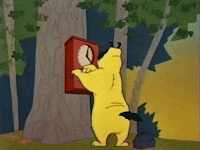Two posts a week is becoming a kinda regular thing here, isn’t it…?
So, hey, you may have seen that a certain set of writing “rules” was passed around Twitter recently. Not so much rules, in this case, as a collection of trolling and rejected fortune cookie messages. People made fun of it. I was one of them.
But a few people also put up serious, much more useful lists. Things to help with being a writer and with the writing itself. And I thought, hey, I’m not going to be posting on Thursday because of Thanksgiving (I’ve got a turkey to cook and classic movies to watch)… maybe I could do a top ten list, too!
Because I always make sure to jump on every trend a good week after it’s dead.
I did a whole post about it over on my MySpace page.
1 – Write Every Day
If I want to do this for a living, I have to think of writing as a job. That’s an ugly truth. This is my job. I do it full time. Probably more than full time. I’d guess at least once or twice a month I’ll have a week where I work hours close to my film crew years.
Yeah, you may not be there yet. I get that. But the whole reason I got here is because I started treating my writing like something that had to happen every week. It wasn’t a hobby, it was something that needed to get done. Because if it didn’t need to get done… well, it usually didn’t.
2 – Read
As I write this,
I’ve just finished reading my 46th book of the year.
That’s not counting a ton of comics, research material, a bunch of gaming rule/ sourcebooks, and probably three or four Washington Post articles every day.
Like anything, writing is input-output.
I can’t get the engine to run of it doesn’t have fuel.
No, alcohol isn’t fuel. It’s just lubricant. And too much lubricant eventually just makes you spin and place without accomplishing anything.
3 – Learn to Spell
I’ve talked about this many,
many, many times.
Learn words.
Learn how to spell them.
Learn what they mean.
Words are the building blocks of writing.
The bare-bones foundation.
Wanting to be a writer when I can’t spell is like wanting to be a chef when I don’t know the difference between salt and sugar.
Don’t be scared to grab a dictionary or type something into Google. Nobody will judge you for it. I do it all the time, even just to confirm I’m right about exactly what a word means. Hell, I did it twice late last night as I was finishing up copyedits on a book.
4 – Exercise your mind
I just talked about this a while ago, too.
I’m a big believer that the mind is like any other muscle group.
You can’t just do one thing with it.
Don’t be scared to experiment with other creative things.
Build a bookshelf.
Play with LEGO bricks.
Cook a meal.
Sketch something.
Paint something.
Sing something.
Hell, balance your checkbook.
Do your taxes.
Let your brain flex in different ways.
5 – Exercise your body
Another sad truth about writing. It generally involves sitting on your butt and well, not doing much. From a physical point of view.
Cool science fact. The brain needs oxygen to work. Oxygen comes from blood. Blood flow increases with exercise and decreases when we… well, sit on out butts. So exercise actually makes it easier to write.

And I don’t mean go buy a punching bag or get a gym membership.
If you can do these things, great, but just stand up from your desk or kitchen table and move around a bit.
Go for a walk.
Play with your dogs.
Just get that blood flowing.
Khorne cares not from where the blood flows, as long as it flows!
Skulls for the skull throne!
Wait, sorry, ignore those last bits…
6 – Learn the Rules
I know nobody likes to hear this part but…
there are rules to writing.
Like spelling (see # 3 up above). They aren’t ironclad things, but they do exist and they exist for a reason.
Rules are the common ground we interact on as authors and readers.
You know why I can’t read Chinese?
Because I don’t know the basic language rules of Chinese.
Those writers are communicating in a way I can’t understand.
And the same holds for writing in English if I don’t know the basic rules of English.
Likewise, there are rules to storytelling.
Again,
not unbreakable ones, but they’re real and. on one level or another, we’re all aware of them.
Certain universal expectations, and also some that are more tailored for different genres or styles.
I need to have a good sense of how these rules work if I want to tweak or openly subvert them.
7 – Have Fun
I know, I know… After some of the other things I’ve said, this sounds impossible, right?
Whatever reason I have for writing, I should be having fun with it.
Don’t listen to those weirdoes who talk about
starving artists or suffering for their art or any of that nonsense.
All that approach does is make you… well, not like writing.
Why would I want to spend all my time doing something I inherently don’t like?
Believe it or not, you can be a real writer without ever once feel tortured, anguished, or misunderstood.
Like so many things in life, if writing makes me feel miserable and frustrated… maybe I’m doing it wrong.
Again, be really cautions about listening to those
“artistic” folks who insist writing has to be
a traumatic experience.
Write about stuff you love, about ideas you’re enthusiastic about.
Let writing be the
high point of your day, and let that joy carry through onto the page.
8 – Write
Yeah, again. It’s important.
At the end of the day, the only real yardstick we have for progress is making words appear on the screen (or in the legal pad or on that parchment you make yourself at that secluded cabin out in the hills). I can attend all the conferences and seminars I want, read every instructional book or blog post with a list of rules, but if I’m not actually writing… it doesn’t really matter.
I was that guy for a while.
I could tell you a lot about writing, what it meant to be a writer, what I planned to write… but I never wrote anything.
I never made any headway.
And if I don’t write—if I never produce a finished manuscript—it means I can never write a second manuscript.
I can never have
a better draft.
The only way to move forward is… writing.
9 – Don’t be Scared to Break the Rules
So there are rules. No question, no discussion. Rules exist.
This is why I always get a bit leery about gurus and books that say things like “by page twenty-three, you should have…” or “heroic quests follow this pattern…”
A side-effect of saying “do this” is people get the idea things always need to be done that way.
If the worksheet’s telling me I
mustknow the answer to these seventeen questions about my character, the implication is that if I only know twelve I must be a bad writer who made a bad character.
Even if I know the answer to
seventeen different questions, or twenty-nine other questions, the book said
those were the important ones.
Yeah, screw all that. Ignore it.
I read these books sometimes, but I don’t worry about ignoring half of what they say and just pulling out what works for me and the story I’m telling. Or using none of it and just tossing the whole thing. Writing is an art. Even if I’m writing for commercial purposes, it’s still an art. And art is unique to every artist. I can use creative misspellings and odd story structures and characters who don’t fit perfectly in that heroic mold. Or the heroic tights. Or the heroic top… which seems to have shrunk a little in the mid-section since I became a full-time writer.
For example, if everybody’s doing lists of ten, you could just stop at nine.
That’s okay.
It doesn’t mean your list is wrong
And that’s that.
I’ll see you all at the end of the week for the usual Black Friday talk, and next Thursday we’ll talk about, well… next time.
Until then, go write.
Once you nap off all that turkey.









